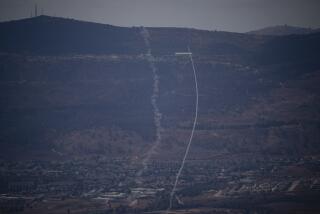Conflicting Pressures Converge on Arafat
- Share via
JERUSALEM — Palestinian leader Yasser Arafat, weakened by the faltering peace process and an internal corruption scandal, finds himself caught in a dilemma: how to satisfy Israeli and U.S. demands for action against Islamic militant groups without angering his own people.
In the aftermath of the twin suicide bombings here Wednesday that killed 15, including the bombers, and wounded dozens of others, Arafat is under considerable pressure to crack down on Hamas and Islamic Jihad, militant organizations that launch attacks on Israeli civilians from areas under his control.
The Palestinian Authority president has acted decisively in the past against extremists. But this time, his credibility with the Palestinian people is so tattered that it is not clear he can deliver on the demands for action, even if he wants to.
“He is weak right now at every level,” said Khalil Shikaki, who heads the Center for Palestine Research and Studies. “No one should expect that he can take any kind of decisive action.”
As Arafat continued to weigh his options, the Israeli government sent hundreds of police and troops into Jerusalem and Tel Aviv on Friday to guard against further attacks. The streets, unusually quiet in recent days because of Israel’s continuing closure of the West Bank and Gaza Strip, were almost completely empty by late afternoon, well before sirens signaled the start of the Jewish Sabbath at 6:59 p.m.
The Israeli army had rounded up 51 Palestinians before dawn, bringing to 80 the number arrested on suspicion of “terrorist activities” since the Wednesday bombings. The security forces acted only in areas under Israeli control, refraining from making good on a threat to mount incursions into Palestinian-held areas.
But Israeli officials, while acknowledging that security cooperation with the Palestinians had improved slightly since Wednesday and that Palestinian police had arrested some militants, continued to accuse Arafat of paying mere lip service to their demands for a serious crackdown.
“We are seeing absolutely no effort from Arafat, at least of any relevance,” said David Bar-Illan, a senior aide to Prime Minister Benjamin Netanyahu.
Saeb Erekat, the Palestinians’ chief negotiator with Israel, retorted that Netanyahu and his aides are using the attacks to “wage war on Mr. Arafat and the Palestinians” rather than work with them against terrorism. Also, with the bombers still unidentified and their allegiance and motivation unconfirmed, it is too early for decisive action, he said.
U.S. officials generally agreed with Israel, however. President Clinton has called on Arafat to take “concrete steps” to restore security cooperation with Israel and to combat terrorism, but diplomats here say it is difficult to tell yet just how much Arafat is doing to clamp down on militants.
“We know there have been some arrests, but we don’t know if anything’s being done with the groups’ infrastructure, bank accounts, safe houses and weapons caches,” said one official involved in the U.S. contacts. “He’s not telling us.
“Arafat’s obviously torn,” the diplomat went on. “He knows what he has to do, but he seems to be going back and forth because of the political risk involved.”
As commentator Hemi Shalev wrote Thursday in the Israeli newspaper Maariv, the bombings also have damaged Arafat’s hope of gaining U.S. support for his battle against Netanyahu’s policy of building new Jewish settlements on occupied land. “The attack will now transfer the focus of American attention away from Israeli construction in Jerusalem and . . . toward terrorism,” Shalev wrote.
The situation was far different just over a year ago. The peace process with Israel was progressing, and Arafat and his Fatah movement had just scored a decisive victory in the first Palestinian elections, giving him political legitimacy he had never had.
After 60 people died in Israel in a series of suicide attacks in February and March 1996, Arafat acted decisively, crippling Hamas and Islamic Jihad by jailing more than 1,200 people, including military and political leaders.
By cracking down on the militants, Arafat hoped to ensure that his peace partner, Labor Party leader and then-Prime Minister Shimon Peres, remained in power.
But Peres lost to Likud Party leader Benjamin Netanyahu in national elections that May. And Netanyahu, suspicious of the peace process that Arafat and Peres embraced, has drastically slowed its pace and taken other actions that have caused Arafat to lose credibility among Palestinians.
*
Since Netanyahu’s election, Arafat has had little in the way of new territory to show his people. He has also been helpless to prevent unilateral Israeli actions such as the decision to build a new Jewish neighborhood on Jerusalem’s southeastern outskirts. Palestinians want the area as part of a future Palestinian capital.
With little perceived benefit for their peace efforts, Arafat and his security services are reluctant to move too forcefully against Islamic militants for fear of appearing to do Israel’s bidding, Shikaki said.
At the moment, the total closure of the territories, during which most Palestinians cannot enter Israel or even travel between Palestinian-controlled cities, is increasing economic hardship and fueling anger.
To make matters worse, Arafat’s government is caught up in a widespread corruption scandal, accused by Palestinian legislators and others of mismanaging or losing millions of dollars in public money. Late Friday, all but two of his 18-member Cabinet, including several of his most senior political allies, offered him their resignations. It was unclear how many he would accept.
“He’s under tremendous pressure domestically, enough that it would almost be politically suicidal to move forcefully now against Hamas or Islamic Jihad,” Shikaki said. “In the end, he will have to act against their military infrastructure, but he’ll do it in a very gradual way, and not to the extent Israel wants.”
More to Read
Sign up for Essential California
The most important California stories and recommendations in your inbox every morning.
You may occasionally receive promotional content from the Los Angeles Times.










